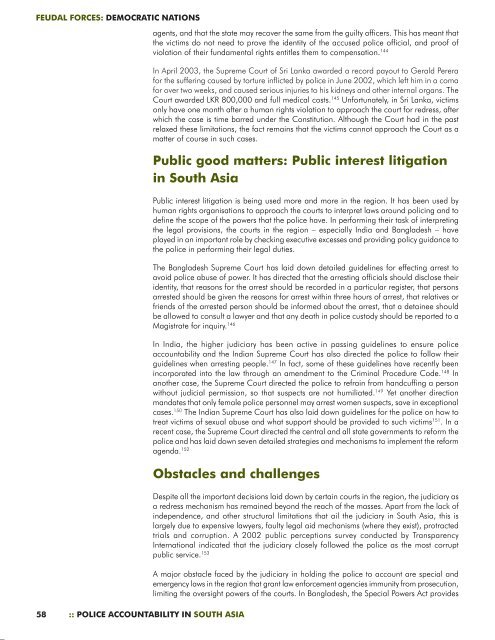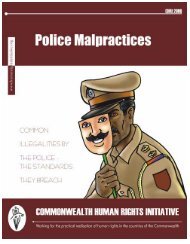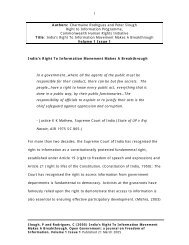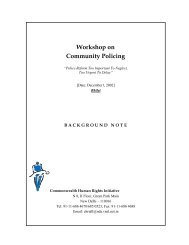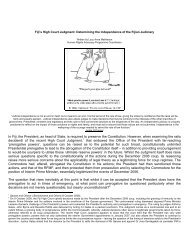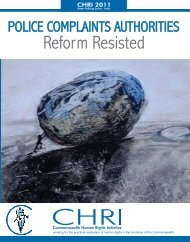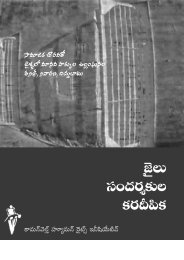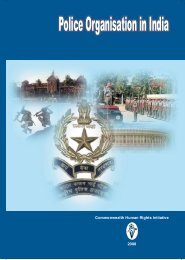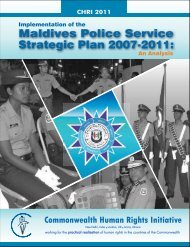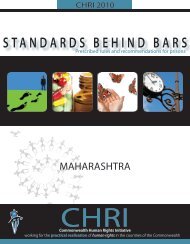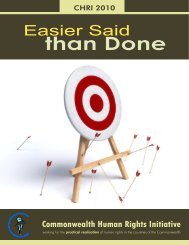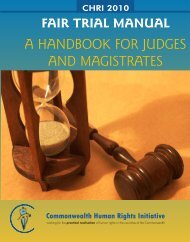Feudal Forces: Democratic Nations - Police Accountability in
Feudal Forces: Democratic Nations - Police Accountability in
Feudal Forces: Democratic Nations - Police Accountability in
Create successful ePaper yourself
Turn your PDF publications into a flip-book with our unique Google optimized e-Paper software.
FEUDAL FORCES: DEMOCRATIC NATIONS58 :: POLICE ACCOUNTABILITY IN SOUTH ASIAagents, and that the state may recover the same from the guilty officers. This has meant thatthe victims do not need to prove the identity of the accused police official, and proof ofviolation of their fundamental rights entitles them to compensation. 144In April 2003, the Supreme Court of Sri Lanka awarded a record payout to Gerald Pererafor the suffer<strong>in</strong>g caused by torture <strong>in</strong>flicted by police <strong>in</strong> June 2002, which left him <strong>in</strong> a comafor over two weeks, and caused serious <strong>in</strong>juries to his kidneys and other <strong>in</strong>ternal organs. TheCourt awarded LKR 800,000 and full medical costs. 145 Unfortunately, <strong>in</strong> Sri Lanka, victimsonly have one month after a human rights violation to approach the court for redress, afterwhich the case is time barred under the Constitution. Although the Court had <strong>in</strong> the pastrelaxed these limitations, the fact rema<strong>in</strong>s that the victims cannot approach the Court as amatter of course <strong>in</strong> such cases.Public good matters: Public <strong>in</strong>terest litigation<strong>in</strong> South AsiaPublic <strong>in</strong>terest litigation is be<strong>in</strong>g used more and more <strong>in</strong> the region. It has been used byhuman rights organisations to approach the courts to <strong>in</strong>terpret laws around polic<strong>in</strong>g and todef<strong>in</strong>e the scope of the powers that the police have. In perform<strong>in</strong>g their task of <strong>in</strong>terpret<strong>in</strong>gthe legal provisions, the courts <strong>in</strong> the region – especially India and Bangladesh – haveplayed <strong>in</strong> an important role by check<strong>in</strong>g executive excesses and provid<strong>in</strong>g policy guidance tothe police <strong>in</strong> perform<strong>in</strong>g their legal duties.The Bangladesh Supreme Court has laid down detailed guidel<strong>in</strong>es for effect<strong>in</strong>g arrest toavoid police abuse of power. It has directed that the arrest<strong>in</strong>g officials should disclose theiridentity, that reasons for the arrest should be recorded <strong>in</strong> a particular register, that personsarrested should be given the reasons for arrest with<strong>in</strong> three hours of arrest, that relatives orfriends of the arrested person should be <strong>in</strong>formed about the arrest, that a deta<strong>in</strong>ee shouldbe allowed to consult a lawyer and that any death <strong>in</strong> police custody should be reported to aMagistrate for <strong>in</strong>quiry. 146In India, the higher judiciary has been active <strong>in</strong> pass<strong>in</strong>g guidel<strong>in</strong>es to ensure policeaccountability and the Indian Supreme Court has also directed the police to follow theirguidel<strong>in</strong>es when arrest<strong>in</strong>g people. 147 In fact, some of these guidel<strong>in</strong>es have recently been<strong>in</strong>corporated <strong>in</strong>to the law through an amendment to the Crim<strong>in</strong>al Procedure Code. 148 Inanother case, the Supreme Court directed the police to refra<strong>in</strong> from handcuff<strong>in</strong>g a personwithout judicial permission, so that suspects are not humiliated. 149 Yet another directionmandates that only female police personnel may arrest women suspects, save <strong>in</strong> exceptionalcases. 150 The Indian Supreme Court has also laid down guidel<strong>in</strong>es for the police on how totreat victims of sexual abuse and what support should be provided to such victims 151 . In arecent case, the Supreme Court directed the central and all state governments to reform thepolice and has laid down seven detailed strategies and mechanisms to implement the reformagenda. 152Obstacles and challengesDespite all the important decisions laid down by certa<strong>in</strong> courts <strong>in</strong> the region, the judiciary asa redress mechanism has rema<strong>in</strong>ed beyond the reach of the masses. Apart from the lack of<strong>in</strong>dependence, and other structural limitations that ail the judiciary <strong>in</strong> South Asia, this islargely due to expensive lawyers, faulty legal aid mechanisms (where they exist), protractedtrials and corruption. A 2002 public perceptions survey conducted by TransparencyInternational <strong>in</strong>dicated that the judiciary closely followed the police as the most corruptpublic service. 153A major obstacle faced by the judiciary <strong>in</strong> hold<strong>in</strong>g the police to account are special andemergency laws <strong>in</strong> the region that grant law enforcement agencies immunity from prosecution,limit<strong>in</strong>g the oversight powers of the courts. In Bangladesh, the Special Powers Act provides


